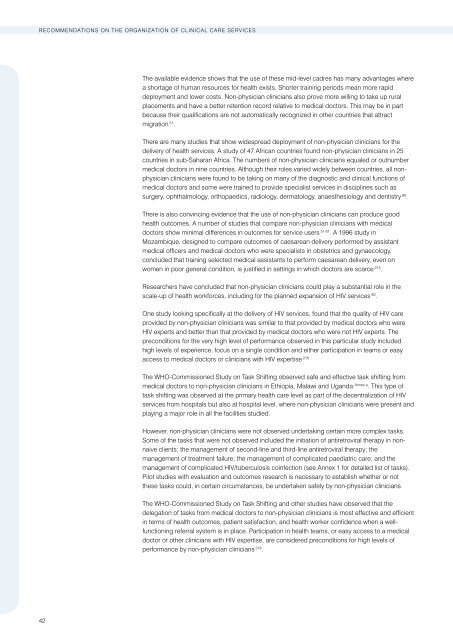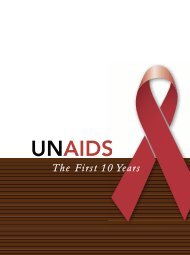Task Shifting - Global Recommendations and Guidelines - unaids
Task Shifting - Global Recommendations and Guidelines - unaids
Task Shifting - Global Recommendations and Guidelines - unaids
You also want an ePaper? Increase the reach of your titles
YUMPU automatically turns print PDFs into web optimized ePapers that Google loves.
<strong>Recommendations</strong> on the organization of clinical care services<br />
The available evidence shows that the use of these mid-level cadres has many advantages where<br />
a shortage of human resources for health exists. Shorter training periods mean more rapid<br />
deployment <strong>and</strong> lower costs. Non-physician clinicians also prove more willing to take up rural<br />
placements <strong>and</strong> have a better retention record relative to medical doctors. This may be in part<br />
because their qualifications are not automatically recognized in other countries that attract<br />
migration 51 .<br />
There are many studies that show widespread deployment of non-physician clinicians for the<br />
delivery of health services. A study of 47 African countries found non-physician clinicians in 25<br />
countries in sub-Saharan Africa. The numbers of non-physician clinicians equaled or outnumber<br />
medical doctors in nine countries. Although their roles varied widely between countries, all nonphysician<br />
clinicians were found to be taking on many of the diagnostic <strong>and</strong> clinical functions of<br />
medical doctors <strong>and</strong> some were trained to provide specialist services in disciplines such as<br />
surgery, ophthalmology, orthopaedics, radiology, dermatology, anaesthesiology <strong>and</strong> dentistry 80 .<br />
There is also convincing evidence that the use of non-physician clinicians can produce good<br />
health outcomes. A number of studies that compare non-physician clinicians with medical<br />
doctors show minimal differences in outcomes for service users 51 61 . A 1996 study in<br />
Mozambique, designed to compare outcomes of caesarean delivery performed by assistant<br />
medical officers <strong>and</strong> medical doctors who were specialists in obstetrics <strong>and</strong> gynaecology,<br />
concluded that training selected medical assistants to perform caesarean delivery, even on<br />
women in poor general condition, is justified in settings in which doctors are scarce 215 .<br />
Researchers have concluded that non-physician clinicians could play a substantial role in the<br />
scale-up of health workforces, including for the planned expansion of HIV services 80 .<br />
One study looking specifically at the delivery of HIV services, found that the quality of HIV care<br />
provided by non-physician clinicians was similar to that provided by medical doctors who were<br />
HIV experts <strong>and</strong> better than that provided by medical doctors who were not HIV experts. The<br />
preconditions for the very high level of performance observed in this particular study included<br />
high levels of experience, focus on a single condition <strong>and</strong> either participation in teams or easy<br />
access to medical doctors or clinicians with HIV expertise 216<br />
The WHO-Commissioned Study on <strong>Task</strong> <strong>Shifting</strong> observed safe <strong>and</strong> effective task shifting from<br />
medical doctors to non-physician clinicians in Ethiopia, Malawi <strong>and</strong> Ug<strong>and</strong>a Annex a . This type of<br />
task shifting was observed at the primary health care level as part of the decentralization of HIV<br />
services from hospitals but also at hospital level, where non-physician clinicians were present <strong>and</strong><br />
playing a major role in all the facilities studied.<br />
However, non-physician clinicians were not observed undertaking certain more complex tasks.<br />
Some of the tasks that were not observed included the initiation of antiretroviral therapy in nonnaive<br />
clients; the management of second-line <strong>and</strong> third-line antiretroviral therapy; the<br />
management of treatment failure; the management of complicated paediatric care; <strong>and</strong> the<br />
management of complicated HIV/tuberculosis coinfection (see Annex 1 for detailed list of tasks).<br />
Pilot studies with evaluation <strong>and</strong> outcomes research is necessary to establish whether or not<br />
these tasks could, in certain circumstances, be undertaken safely by non-physician clinicians.<br />
The WHO-Commissioned Study on <strong>Task</strong> <strong>Shifting</strong> <strong>and</strong> other studies have observed that the<br />
delegation of tasks from medical doctors to non-physician clinicians is most effective <strong>and</strong> efficient<br />
in terms of health outcomes, patient satisfaction, <strong>and</strong> health worker confidence when a wellfunctioning<br />
referral system is in place. Participation in health teams, or easy access to a medical<br />
doctor or other clinicians with HIV expertise, are considered preconditions for high levels of<br />
performance by non-physician clinicians 216 .<br />
42

















